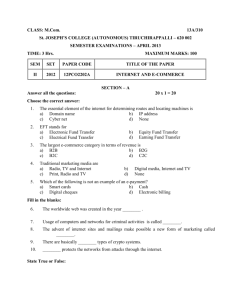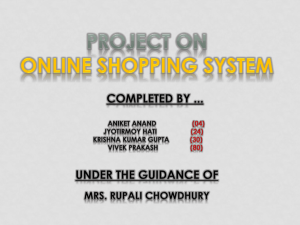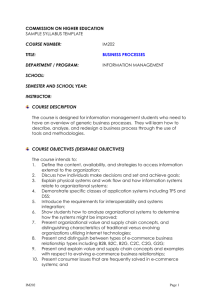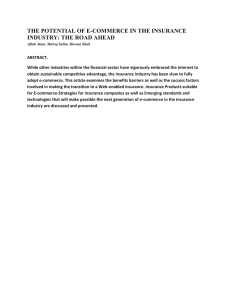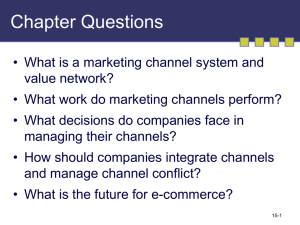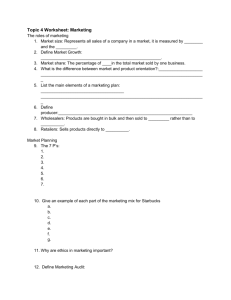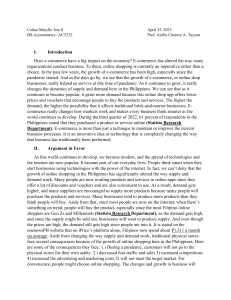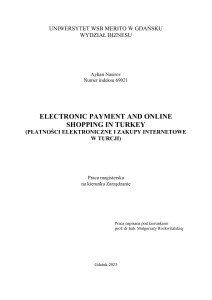Technology's Impact: Energy, Genomics, Data, Internet
advertisement
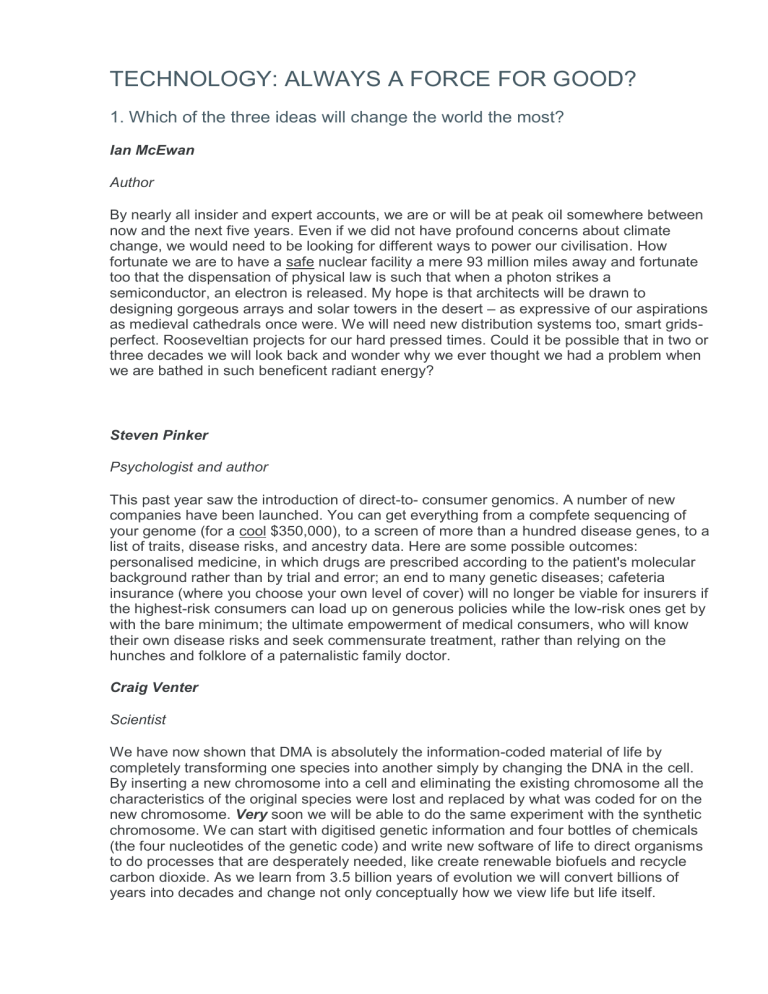
TECHNOLOGY: ALWAYS A FORCE FOR GOOD? 1. Which of the three ideas will change the world the most? Ian McEwan Author By nearly all insider and expert accounts, we are or will be at peak oil somewhere between now and the next five years. Even if we did not have profound concerns about climate change, we would need to be looking for different ways to power our civilisation. How fortunate we are to have a safe nuclear facility a mere 93 million miles away and fortunate too that the dispensation of physical law is such that when a photon strikes a semiconductor, an electron is released. My hope is that architects will be drawn to designing gorgeous arrays and solar towers in the desert – as expressive of our aspirations as medieval cathedrals once were. We will need new distribution systems too, smart gridsperfect. Rooseveltian projects for our hard pressed times. Could it be possible that in two or three decades we will look back and wonder why we ever thought we had a problem when we are bathed in such beneficent radiant energy? Steven Pinker Psychologist and author This past year saw the introduction of direct-to- consumer genomics. A number of new companies have been launched. You can get everything from a compfete sequencing of your genome (for a cool $350,000), to a screen of more than a hundred disease genes, to a list of traits, disease risks, and ancestry data. Here are some possible outcomes: personalised medicine, in which drugs are prescribed according to the patient's molecular background rather than by trial and error; an end to many genetic diseases; cafeteria insurance (where you choose your own level of cover) will no longer be viable for insurers if the highest-risk consumers can load up on generous policies while the low-risk ones get by with the bare minimum; the ultimate empowerment of medical consumers, who will know their own disease risks and seek commensurate treatment, rather than relying on the hunches and folklore of a paternalistic family doctor. Craig Venter Scientist We have now shown that DMA is absolutely the information-coded material of life by completely transforming one species into another simply by changing the DNA in the cell. By inserting a new chromosome into a cell and eliminating the existing chromosome all the characteristics of the original species were lost and replaced by what was coded for on the new chromosome. Very soon we will be able to do the same experiment with the synthetic chromosome. We can start with digitised genetic information and four bottles of chemicals (the four nucleotides of the genetic code) and write new software of life to direct organisms to do processes that are desperately needed, like create renewable biofuels and recycle carbon dioxide. As we learn from 3.5 billion years of evolution we will convert billions of years into decades and change not only conceptually how we view life but life itself. DATA LOSS: HUMAN ERROR OR MACHINE ERROR? ____1 Recent evidence could suggest that while the technophobes are correct with the first half of their accusation, they may not be so correct with the rest. In fact, recent research suggests that in more and more cases it is the human being who is responsible for the failure of technology, particularly in the world of computers and, specifically with regard to the loss of data. Data recovery experts, the technological doctors and nurses of desktop or laptop hard drives, say the technical breakdown of computers is still the main cause of data loss, although human error in the form of lack of care and even rage is fast becoming one of the main reasons files need rescuing. ___2 However, it is dear that users still have to do more to protect their data. In fact, it may be true that precisely because computers have become less likely to break down, humans have been less careful with using the computer, and have become more responsible than the machines themselves for the loss of data. In fact, this trust has become so strong that when a user feels 'betrayed' by his or her machine, they may react in extreme ways. For example, take the American man who was so frustrated with his laptop that he shot it in a fit of e-rage. Once he calmed down he realised that there were important files he needed. Amazingly the data recovery experts were able to retrieve them. ___3 One company director would not have lost his company's business accounts if his laptop hadn't accidentally fallen into the bath he was having. Another businessman lost all the notes for his presentation because he left his laptop on the roof before getting into the car and driving off. ___4 There are countless examples of people forgetting them on public transport and in cafes or bars. Experts recommend data be backed up daily or weekly and regular checks are made on back-up systems to ensure they are working, especially, in the case of laptops. ___5 More men than women seem to be likely to try and retrieve the data themselves before asking for help from the experts, which can sometimes lead to more damage to the computer. A user who had problems with his DVD drive actually tried to fix the computer with his trusted screwdriver, resulting in the computer refusing to work at all. __6 However, the truth Is that it could quite well happen to you. Although the user may have little control when the ghost in the machine causes the loss, they have a lot of control over what they do when they use their computers. Technology will always only be as good as the person using it, no matter how advanced the technology is... at least until technology finds its users obsolete. THE POWER OF THE INTERNET 1. IS THE INTERNET A DRIVING FORCE FOR CHANGE? THE INTERNET: A DRIVING FORCE FOR CHANGE? Computers may never offer a perfect system for work and communications. Yet, in spite of the bugs that need to be worked out, there is no question that computers now shape the pattern of our activities. Almost everyone has felt the tremors of change as the Internet has revolutionized the way we do things: from the way we run our daily errands to the way we relate to other human beings. With the Internet, we can now get to information, products, and friends more quickly. With a few clicks of the mouse, we can do research on specific subjects that might have taken hours or days in a library. With online shopping, we can purchase what we need more quickly and efficiently; we can now deal with retailers over the Internet instead of waiting in lines at shopping malls. With e- mail, we can maintain friendships as well as create new ones, without ever sitting down to write or post a letter. The Internet now binds more people around the world together through their common interests. For example, many people participate in Internet “chats.” These are informal discussions in which people type their questions and answers to each other on the computer. There is very little delay in the “conversation.” And unlike spoken conversations, “chats” can involve hundreds of people— all of whom are interested in the topic being discussed. Some Internet discussions lead to more than typing. According to a Rutgers University study, more than 1 million people have had online correspondences that have led to face-to-face relationships. The Internet has literally created a new kind of social life. But not everyone feels the Internet is improving our lives. The Web is messy in that it cannot always provide clear directions on how to get where we want to go. The hyperlinks that exist among different Web sites often send people on a trip to nowhere or somewhere totally unexpected. The Web is not an organized database; rather it is a brier patch, where people can get stuck or lost. Online shopping is an example of this mess. Although shopping from home is appealing, ecommerce is not always as convenient as one might think. Sometimes it takes a long time to order on the Internet. People can waste time or get confused filling out information on all the different screens to place an order. In fact, anywhere from 33 to 75 percent (depending on whose statistics you use) of people who shop online drop out before ever placing their order. Most importantly, many people are concerned about privacy issues. They are reluctant to put their personal information on the Web. Filling in information such as one’s name, address, phone number, and credit card information can shake the confidence of an online shopper. Some even fear that there is a conspiracy among businesses to use consumer information for their own benefit. Perhaps even more troubling is the belief that as people spend more time surfing the Web, they are becoming socially isolated. A recent survey indicated that 16 percent of Internet users spend less time with family and friends. The amount of time a husband or wife spend on the Web is frequently cited as one cause for divorce. Many young people say that their closest friends are those they have corresponded with on the Internet, that is, their closest friends are people they have never even met. Whether the Internet will continue to be a driving force for change is still unknown; and whether the effects of the Internet on our lives will be more positive or negative is still debatable. 1. THE INTERNET AND E-COMMERCE THE INTERNET AND E-COMMERCE The Internet hyperlinks web page web address banner advertisement The Internet service provider or ISP is the organization that provides you with Internet access. You register and open an account, then they give you an email address so that you can communicate by email with other users. Some ISPs have their own content - news, information and so on - but many do not. After you log on by entering your user name and password (a secret word that only you know), you can surf to any site on the World Wide Web. If you’re looking for a site about a particular subject, you can use a search engine like Google or Yahoo. When you’ve finished, remember to log off for security reasons. Clicks-and-mortar My name’s John, and I own a chain of sports shops. Last year, I started an e-commerce operation, selling goods over the Internet. We’ve done well. Visitors don’t have trouble finding what they want, adding items to their shopping cart and paying for them securely by credit card. Last year we had two million unique users (different individual visitors) who generated 35 million hits or page views. That means our web pages were viewed a total of 35 million times! E-commerce or e-tailing has even acted as a form of advertising and increased levels of business in our traditional bricks-and-mortar shops! Pure Internet commerce operations are very difficult. To succeed, I think you need a combination of traditional retailing and ecommerce: clicks-and- mortar. In our case, this has also helped us solve the last mile problem, the physical delivery of goods to Internet customers: we just deliver from our local stores! B2B, B2C and B2G Selling to the public on the Internet is business-to-consumer or B2C e-commerce. Some experts think that the real future of e-commerce is going to be business-to-business or B2B, with firms ordering from suppliers over the Internet. This is e-procurement. Businesses can also use the Internet to communicate with government departments, apply for government contracts and pay taxes: business-to-government or B2G.
